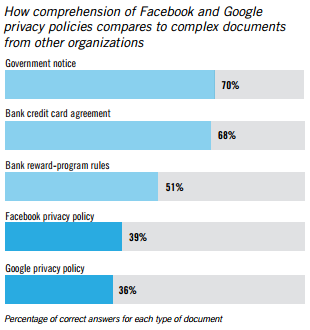Survey: Facebook, Google privacy policies are incomprehensible


In similar studies, 70 percent of respondents correctly answered comprehension questions for government notices and 68 percent of respondents provided the right answers for credit card agreements. The data comes from a survey of more than 400 respondents conducted by global strategic branding firm Siegel+Gale. On a scale of 0 to 100 (a score of 80 indicates good comprehension), respondents scored 39 and 36 for Facebook's and Google's privacy policies, respectively.
After reviewing the policies and answering Siegel+Gale's questions, 36 of Facebook respondents and 37 percent of Google respondents said they would change their online behavior by using these sites less, adjusting their privacy settings and clearing their search histories. Despite Google's recent consolidation of its various privacy policies, respondents still expressed more discomfort after reading the new, condensed policy.
Here are three key findings for Facebook:
- A major comprehension issue is requiring users to leverage an Application Programming Interface (API) to understand how their information is used. Less than 40 percent of Facebook users understood how an API can be used to access and view public information.
- Only 15 percent correctly understood what happens to their accounts after they're deleted on Facebook.
- Just 20 percent could correctly identify how to block outside apps and websites from accessing their information on Facebook.
Here are three key findings for Google:
- 23 percent of Google users understood that their profile is visible to anyone online.
- More than half were not aware that the privacy policy also applied to their use of Google Talk, Google Maps, YouTube, and Blogger.
- Only 38 percent understood that Google connects search activity to a user's IP address whether or not they sign into a Google account.
Siegel+Gale suggests the two Web giants improve online privacy policy documents by:
- Succinctly conveying what information is collected, how the information is stored and shared, and how a user can manage their privacy. Consolidation is not the answer, nor is asking users to read detailed information intended for web developers, as Facebook does when it directs users to information about the Graph API.
- Standardizing policies so that users can more easily understand privacy implications. A good example is the nutrition facts labels used on food and beverages. Using a standard model, people would more quickly understand privacy implications and compare services. Current policies take dedicated readers hours to review because of their length, numerous links, and complex wording.
- Designing a feedback loop into digital interfaces. This would inform users instantaneously of potential privacy issues as they occur and enable users to make wiser choices about sharing information.
- Allowing users to opt in to share and publicize information. By setting the most conservative privacy settings as the default and letting users decide to expand how their information is tracked, shared and stored, service providers would meet the stated needs of users. Between 70 and 80 percent of respondents agreed with the Obama administration's plan to make it easier for users to control online tracking of consumer personal information.
"This complexity erodes trust and jeopardizes online privacy," Irene Etzkorn, executive director of simplification of Siegel+Gale, said in a statement. "Clearly, Facebook, Google and other online service providers operate based on consumer trust, and failure to address privacy concerns in a meaningful way will lead to consumer disenchantment and additional regulatory restrictions."
The full survey results are available in an 11-page document titled "Knowing more about privacy makes users share less with Facebook and Google" (PDF).
See also:
- Here's what Facebook sends the cops in response to a subpoena
- Mark Zuckerberg: Facebook users eventually get over privacy anxiety
- Facebook CTO: most people have modified their privacy settings
- Facebook moves privacy controls inline, simplifies sharing
- Facebook settles with FTC over default privacy settings
- Facebook promises changes following Irish privacy audit
- 70% of Facebook users are comfortable with what they share